Posts Tagged ‘covid-19’
When Faith Leaders Join the Fight
Around the world, faith leaders are often trusted, respected and influential members of society. For decades, World Relief has seen the impact that working alongside faith leaders and communities can have in the face of natural and man-made disasters.
From the earliest days of the COVID-19 pandemic, we knew that the local church was uniquely positioned to support communities through this global disaster. However, it cannot be denied how challenging the pandemic has been for faith communities.
In Rwanda, frequent and serious lockdowns in the first year and a half of the pandemic prevented social and faith gatherings. Faith institutions were closed for months on end, rendering many faith leaders’ ministries and livelihoods a minefield to navigate.
At the same time, faith communities in many countries were largely left out of initial nation-wide responses to COVID-19, including vaccination rollouts. And yet, research has shown that religious factors are the third most frequently cited reason for vaccine hesitancy globally, making involvement of faith actors in COVID-19 vaccination efforts imperative.
Building on our existing work of empowering local churches to serve the most vulnerable, World Relief stepped in to fill these gaps.
Across the globe, we have equipped church leaders with prevention messages and, as vaccines became available, trusted information and training to help accurately inform conversations and decision making in congregations. What’s more, in places like Rwanda, we helped churches provide food and basic necessities to those most impacted by shutdowns.
Together, even as doors closed on church buildings, we were able to support pastors and churches to continue being the church during this crucial time of response. — mobilizing faith communities to care for the vulnerable in the fight against the virus.
Putting the Right Tools in the Right Hands
In Malawi, DR Congo, Kenya and Rwanda, much of our work to engage faith leaders and their communities in the fight against COVID-19 is happening in partnership with USAID through the SCOPE COVID-19 project.
Through SCOPE COVID-19, we have created and organized trainings for faith and community leaders on how to engage faith communities in dialogues promoting COVID prevention and vaccination. These trainings use story-based curriculum created by World Relief and designed to put trusted information in the hands of community and faith leaders.
Access to accurate and updated COVID-19 information has been especially important for people like Uwambajimana Marie Claire in Rwanda. As a prayer leader in her local church, she knew that people were looking to her for guidance on vaccines. “If I could not accept the vaccine,” she said, “no one in the group would accept it.”
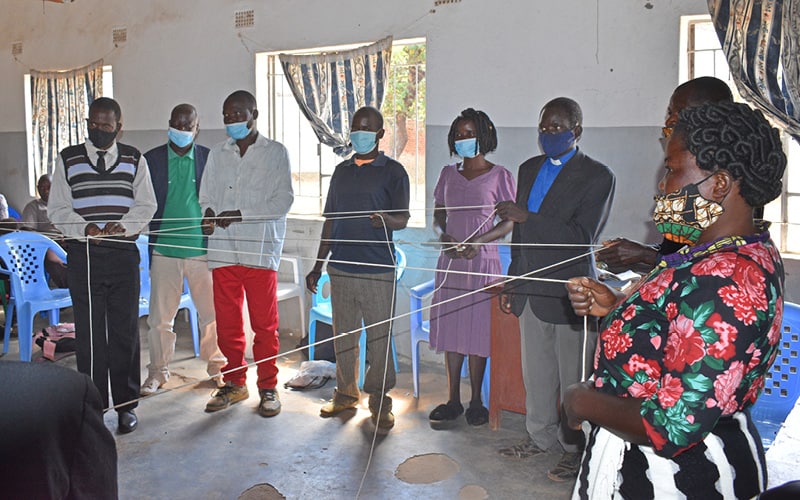
As in many places around the world, Marie Claire had heard frightening rumors about the COVID-19 vaccine. Distrust of the vaccine ran deep in her community, and she wanted to find out the truth. So Marie Claire prayed that God would reveal to her what was true.
When she participated in World Relief’s SCOPE COVID-19 training session on Risk Communication and Community Engagement, Marie Claire found answers to her prayer and to her questions about the vaccine.
“During the training,” Marie Claire said, “I heard that to fight against the pandemic, the vaccine is crucial. After hearing examples of many past pandemics that ended, resulting from vaccinations, and hearing the testimony of other believers who were vaccinated, I realized that I was headed in the wrong direction.”
Marie Claire decided to get vaccinated, and now she’s encouraging others in her community to join the fight against COVID-19 by getting vaccinated, too.
The World Relief COVID-19 curriculum used to train people like Marie Claire has been so successful at mobilizing faith communities at both the local and national level against COVID-19 that it has been adopted by the ministries of health in Kenya and Rwanda to be used by other partners throughout the countries.
Multiplying Faith Leader Impact
World Relief is currently working closely with over 11,230 local faith leaders through SCOPE COVID-19. As these leaders are equipped with accurate information, they’re driving conversations about COVID-19 in their communities.
Some leaders are leveraging regular radio talk shows and have reached an estimated 11,342,732 people across four countries so far. Others incorporate reliable prevention and vaccine information into faith gatherings or visit members of their communities door-to-door to share information and provide guidance.
Many congregants are reporting that the example of their faith leaders is building their confidence in the effectiveness of prevention measures and the safety of COVID-19 vaccines.
This is especially making an impact on vaccine uptake in these communities. To date, World Relief has directly supported the administration of vaccines to 241,590 individuals through SCOPE COVID-19.
One World Relief Rwanda volunteer shared that when vaccines first became available, they couldn’t find a single person in their faith community willing to get vaccinated. “[But] since faith leaders got involved,” they said, “it’s a different story. The church engagement in this fight has obviously made a tremendous impact.”
Leading the Way in Faith
Today, we are continuing to press forward alongside faith leaders in the fight against COVID-19 in Sub-Saharan Africa. Through SCOPE COVID-19, we’ve seen once again that faith leaders — when engaged consistently and intentionally at the national and local levels — can and will help their communities meet the needs of the most vulnerable.
Even as vaccination rates increase, the residual effects of COVID-19 remain devastating and the need for local communities of faith to act in love and mercy towards their neighbors remains high. At World Relief, we remain committed to equipping faith leaders around the world to lead their communities towards health, restoration and transformation.
Read more about our global response to COVID-19 and how you can help us care for those most affected by the pandemic.
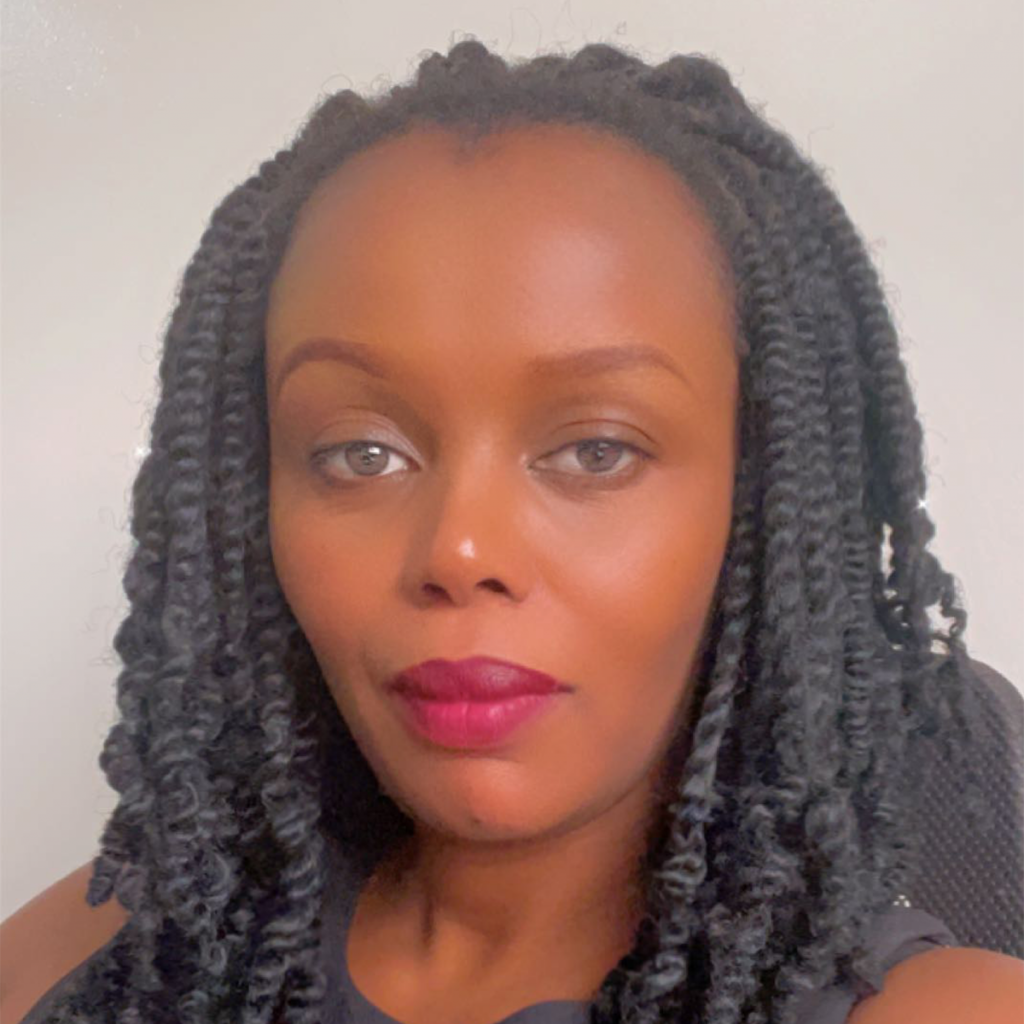
Sonia Karibagiza is a Rwandan Communications Specialist with 10 years of technical experience. She is passionate about educating the public and ensuring their safety. Since the beginning of the COVID-19 outbreak, she has been responding as a part of various teams implementing communication strategy under the Rwanda Joint Task Force on COVID-19, including managing World Relief’s SCOPE COVID-19 project in partnership with USAID until February 2022. As the project manager, she coordinated engagement of local leaders, health actors and faith leaders.
Welcoming Afghans in San Diego
Since August, World Relief has welcomed and resettled over 1,000 Afghans who had been evacuated out of Kabul. Today, over 34,000 Afghans remain on eight U.S. military bases awaiting their chance at a new life in the U.S. World Relief is diligently preparing to resettle up to 7,000 of these brave individuals between now and March 2022.
The need is great, and we couldn’t do this work without the help of partners like Hope for San Diego.Today, Susie Fikse, Executive Director at Hope for San Diego, talks about why partnering with World Relief is critical to Hope for San Diego’s mission. Read more to find out how you and your community can move with us, just like Susie and Hope for San Diego have done. Together, we can create communities of love and welcome that we all feel proud to be a part of.
First, can you tell us a little about Hope for San Diego?
Hope for San Diego is an independent non-profit with a mission to engage our community to care for and invest in our under-served neighbors. Our focus areas include refugees/ immigrants, sex trafficking, foster care and homelessness—all pressing issues in San Diego.
How did you first get connected with World Relief?
Twenty-five years ago, I was living in Atlanta. The church my family attended was involved with World Relief, and I signed up to bring Thanksgiving dinner to a refugee family. I remember standing at the door of this family’s small apartment. There were eight people living there. They had no furniture in the living room, but they welcomed me and my family and offered us drinks and fruit. We couldn’t really communicate because of the language barrier, but it was a really meaningful and eye-opening experience.
How did you help bring World Relief to San Diego?
Shortly after I took the job as Executive Director of Hope for San Diego, we began working with refugees in the area. Soon we realized that there were many organizations doing many different things for refugees — all of them great, but very uncoordinated.
For a long time, I felt the need for some kind of umbrella organization to help bring all our efforts together and to make sure the work we were doing was helping instead of hurting. I knew World Relief would be a great partner to bring us all together and help facilitate healthy ministry.
We connected with the World Relief SoCal office, and they did a few trainings with us and our church partners. But when the border crisis came to a head a couple of years ago, it became clear that we needed the expertise of World Relief in closer proximity to all these needs! It took some time to figure out how to make it work, but in March, we were able to fund the first full-time World Relief staff in San Diego, and a group of churches assembled to collaborate in building a more effective ministry to refugees.
Aside from funding, how else does Hope for San Diego partner with World Relief?
Our partner churches volunteer in different ways through the connections World Relief provides, whether that is building friendships with refugees, providing tangible support like furniture or shoes, or participating in tutoring programs.
We have also hosted World Relief speakers at educational events, which is a powerful way to help our community build a Biblical worldview of immigration. Likewise, we sent a select group of leaders on a Border Vision Trip, which opened eyes to the complexity of immigration issues facing people just 30 minutes from our homes.
How is Hope for San Diego specifically working to welcome and resettle Afghans in your community?
Thanks to the support of people within our eight partner churches and other community members, we were very quickly able to form two Good Neighbor Teams, mobilize volunteers to set up apartments and deliver groceries, secure 40 mattress donations and pre-paid phone cards, among so many other things. The immediate and continued response from the community has been encouraging.
We believe that relationships designed to support self-sufficiency are the key to long term transformation—both of the refugees and the volunteers that engage with them. Our goal is to create a minimum of 10 Good Neighbor Teams (4-5 people each) through our partnership with World Relief that will commit to building genuine, long-term friendships, helping refugee families orient to American life and create a future here.
We also believe another key element of welcoming refugees is educating our community about their plight and celebrating the diversity that they help create so in January, we’re hosting and event called “From Strangers to Neighbors.” Matt Soerens from World Relief will be there to speak and we’re eager for the ways this will engage and equip others in our community to respond.
Why is partnering with World Relief one of the things you’ve continued to hold onto?
The work of World Relief is more essential than ever before. The gaps between the affluent and the poor continue to widen and World Relief is helping to bridge those gaps. When I see a refugee family of nine living in a two-bedroom apartment and six kids trying to do online school while their parents are working two jobs, I know that we need to come alongside these families to provide support. Without organizations like World Relief, these kids are going to fall further behind, which has long-term consequences for all of us.
What is your vision for the Church in San Diego, and how do you see World Relief playing a role in that vision?
Our vision is to see God renew San Diego so that even people in the most vulnerable situations can thrive. Our city is not experiencing shalom in the way God intended unless all people are thriving, not just those within our churches. The Church is the vehicle God wants to use to bring renewal and hope to our city. But that means we have to step outside the church and outside our comfort zone to build relationships. In order to do that, we need the right opportunities and the right training. World Relief provides that for us.
We are so grateful for partners like Susie and Hope for San Diego who remind us that when we move together, we can be an irresistible force for good and an agent of lasting change. Help create communities of love and welcome this season by moving with us and giving today.

Rachel Clair serves as a Content Writer at World Relief. With a background in creative writing and children’s ministry, she is passionate about helping people of all ages think creatively and love God with their hearts, souls and minds.
4 Things You May Not Know About COVID-19 and Why You Should Care
As the COVID-19 pandemic continues to disrupt our daily lives and the Delta variant creates new uncertainties, many of us are feeling weary. Experts have a term for this: pandemic fatigue. Pandemic fatigue can cause us to feel disengaged and even hopeless. We may even begin to ask ourselves, “Why should I care about COVID-19?”
Today, we’re sharing four things you may not know about COVID-19 and why you should care. At a time when many of us feel disconnected, COVID-19 continues to show that we’re truly all in this together.
When COVID-19 swept the world in early 2020, we quickly realized it would mean major shifts in the way we serve those in vulnerable situations. Eighteen months later, we’re still learning, still adapting and still uncovering new ways this virus is affecting people across the globe. Here’s what you may not know:
1. Extreme poverty and food insecurity are on the rise.
In 2020, Oxfam and The World Food Bank predicted that half a billion people would be pushed into extreme poverty and a “famine of biblical proportions” would be ushered in by the pandemic. Today, we’re seeing those predictions play out:
- 296 million people worldwide are going without food — a statistic that’s up 111 million from April 2020.
- 56% of the world’s children now lack access to education or health services (up from 47%).
- And the estimated number of COVID-induced poor is expected to rise from 119 million to 124 million.
World Relief President and CEO Myal Greene reflected, “The pandemic is basically undoing a decade’s worth of human development around the world in terms of progress in getting people out of poverty. We’re certainly seeing that in many of the communities where we work.”
2. COVID-19 is disproportionately impacting those in already vulnerable situations.
When Mount Nyiragongo erupted in DR Congo earlier this year, coronavirus was not the first concern on anyone’s mind. “When people were fleeing, nobody cared about COVID-19 preventive measures,” said Jean Nyandwi, World Relief DR Congo Country Director.
“After the people who had fled returned back to the city, the government announced the third wave of COVID-19,” he continued. “We believe partly this volcanic eruption may have increased COVID-19 cases.”
While the volcanic eruption may have increased people’s exposure to the virus, a lack of access to vaccines, as well as vaccine hesitancy, is most certainly putting women and men at a greater risk of contracting the virus.
In a country that already faces one of the world’s worst food security crises, vulnerability to one crisis made increased vulnerability to the COVID crisis inevitable.
And these stories of increased vulnerability are not unique to DR Congo. Across the globe, those in vulnerable situations are experiencing outsized impacts of the pandemic.
“It’s making the poor poorer,” Nyandwi said. “When people get sick, they have to pay for their hospital bills. Burials also cost money. Many people have lost their jobs. Prices have increased for basic commodities, particularly in the city of Goma, and likely this is true for the rest of the country as well.”
3. And it’s not just the poorest of the poor who are being affected.
When we talk about the poorest of the poor, we’re referring to those who live on less than $2 a day. That number is increasing by several hundred million people globally, and that is significant.
But, as Greene mentioned in a recent interview, “other tiers of poverty are also increasing as people are moving down the scale of development. We’ve had to do food distributions among middle-income populations where we haven’t typically had to do such activities before.”
This was the case in Cambodia where an April lockdown affected people like Grandma Phun Phally who lives in Phnom Penh province. Like many small business owners, Phun Phally relies on daily market sales to afford food and basic necessities. Job losses and decreased incomes caused by the COVID-19 pandemic have made it harder for people like her to afford these necessities, and this latest round of shutdowns only intensified the fragile situation.
“The Covid-19 pandemic has caused the government to limit travel during this time, so I and my family members are unable to go out and do business and earn money,” Phun Phally said. “Because our family owns a small business, we don’t have as much money to spend over such a lengthy period of time. That is something we are very concerned about.”
4. Churches and local communities are being equipped to respond.
In Cambodia, World Relief partnered with local churches to supply and distribute food relief packages to the neediest households in Phnom Penh. Grandma Phun Phally was one of the recipients.
“Thank God. He heard our plea and answered it,” she said. “A food shipment from WRC, our church’s partner, was another blessing. This package is extremely beneficial to us in continuing to fight through this difficult period…Pray for everyone to come out on top in this difficult situation.”
In total, World Relief Cambodia gave $20,000 in grants, which funded food relief packages for 1,378 families.
World Relief continues to reach local communities across the globe with accurate COVID-19 prevention messages. Thanks to a $2.3 million grant from USAID, this work is expanding in DR Congo, Kenya, Malawi and Rwanda.
Churches and faith leaders are being equipped and mobilized to rally their congregations and communities around infection prevention efforts including supplying community members with cloth masks, handwashing soap and other community care supplies while also providing accurate information about COVID-19 vaccines.
Faith leaders, who are often seen as trustworthy authorities in local communities, are playing a key role in accelerating equitable access to and widespread use of COVID-19 vaccinations and prevention measures.
Why You Should Care
COVID-19 continues to impact the world and the church continues to respond. But, as individuals facing what can seem at times both insurmountable and far removed, we might still be asking ourselves, “Why should I care about COVID-19?” or even, “What can I possibly do?”
When we asked Greene these questions, we thought his answer captured it perfectly:
This pandemic is the greatest crisis the world has faced within our lifetime, and the people who are most affected by it are those already in the most vulnerable situations in the world. Unless we get this thing under control, that suffering isn’t going to stop and is going to get progressively worse.
In 1 Corinthians, we read about the body of Christ and the idea that when one part suffers the whole body suffers. In the U.S., many of us feel as if we are turning a corner, but right now, many places around the world have not yet turned the corner. Those parts of our body are suffering. But we can help.
We all have a role to play — whether it’s through prayer, getting the vaccine or supporting causes that are helping the most vulnerable through this time — we can help our neighbors get over the edge of this pandemic and we can do it together.
Help your neighbors get over the edge of the pandemic and beyond by giving today or joining The Path.

Kelly Hill serves as a Content Writer at World Relief. She previously served as Volunteer Services Manager at World Relief Triad in North Carolina before moving to Salt Lake City. With a background in International and Intercultural Communication, she is passionate about the power of story to connect people of diverse experiences.

Rachel Clair serves as a Content Writer at World Relief. With a background in creative writing and children’s ministry, she is passionate about helping people of all ages think creatively and love God with their hearts, souls and minds.
Beneath the Chaos Resilience Bloomed: Our Global COVID Response
It was three o’clock on a Tuesday afternoon when Laura Fontaine, Director of World Relief Quad Cities, got the call. A woman in the Congolese community had contracted COVID-19. Shutdowns had already begun across much of the U.S., and World Relief followed suit, closing our offices and suspending all in-person programming.
Halfway across the globe, nearly 8,000 miles away, Moses Ndahiro and his team faced a similar situation in Rwanda when, in mid-March, the country went into total lockdown. As the team began working remotely, they turned to rapid communication tools through mobile platforms like WhatsApp to begin communicating with partners and disseminating COVID-19 prevention messages to churches and communities.
The sudden change and continued uncertainty were destabilizing, and it didn’t take long for the dramatic impact that COVID-19 could have on the world’s most vulnerable to become apparent.
And yet, during what was a very dark time, when we took a step back, we saw creativity, strength and persistence shine through. Fierce courage and bold love grew amidst our upturned world. Beneath the chaos, resilience bloomed.
How it Started, How it’s Growing: World Relief Sacramento’s Welcome Club
In 2018, World Relief Sacramento volunteers Becca and Luke Voight began connecting with refugee youth at a local park. What started as an informal gathering has now grown into a robust program called The Welcome Club.
The Welcome Club partners with four area elementary schools to serve upwards of 100 students. It offers space for immigrant kids to ‘just be kids’. For many of these youth, schoolwork is difficult, and their guardians cannot give the same homework support that their American classmates receive. They are often translators for their parents and caretakers for younger siblings. Even if it’s just for an hour a week, The Welcome Club is where they can have fun with friends and coaches.
Like most of our U.S. programs, The Welcome Club had to make some big adjustments in 2020, moving all of its in-person programming online. I recently spent the day with WR Sacramento’s Children and Youth Manager, Makayla Synak, and got a first-hand look at the magic that happens at The Welcome Club, even in its virtual form. Follow along to learn more and find out how you can create communities of welcome for immigrants in the United States.
9:00 a.m.
Coach Makayla checks her car to make sure she has everything. Her trunk is full of children’s books, binders with waivers and forms, disposable face masks, hand sanitizer and craft supplies. Coffee cup in hand, World Relief blue t-shirt on, she leaves for the World Relief Sacramento office, which has been closed to clients since March of 2020.
9:30 a.m.
Makayla meets Coach Becca in the classroom at the back of the office. Becca, also masked and sporting her World Relief t-shirt, is adding printouts of song lyrics to 60 lunch bags on the floor. Every other Friday, Makayla, Becca and a small group of staff and volunteers take 60+ goodie bags to 12 apartment complexes for children and youth to unpack at their virtual Welcome Club that week.
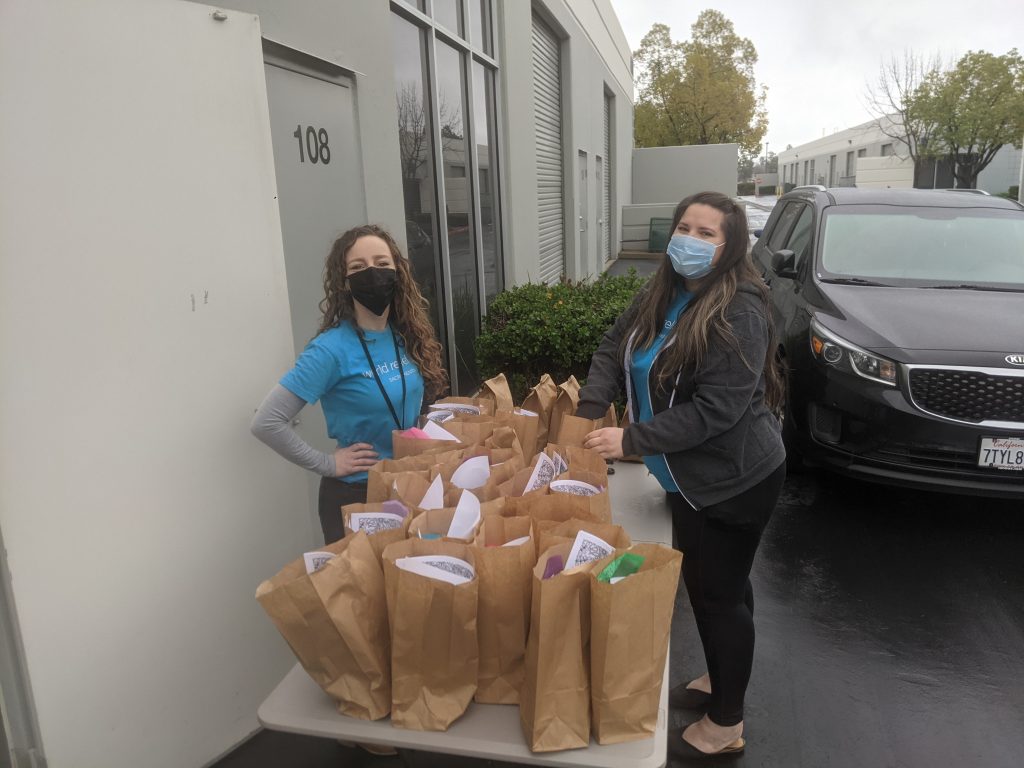
The bags are packed with goldfish crackers, contact paper and a booklet with the week’s Welcome Club theme: “Asking for Help and Giving Help.” Once filled, the bags are stapled shut with a note that says: DON’T OPEN UNTIL WELCOME CLUB. Becca and Makayla joke that most kids open their bags before club, but it’s worth a shot!
11:00 a.m.
Makayla takes a break from prepping goodie bags and logs into a Zoom meeting with a school vice-principal. This past summer, World Relief came together with local schools to talk about solutions for immigrant students who were falling behind due to COVID-19 and not logging onto Zoom for virtual learning.
Schools made a list of students who were struggling the most. Many of these students arrived in the U.S. just before the shutdown, and have never set foot in an American classroom. Since September, Makayla has logged 100 visits to over 50 of these families, checking in, walking through their assignments and giving them a laptop if they didn’t already have one.
12:00 p.m.
Makayla logs off Zoom and heads back to her car. She drives to the Las Palmas apartment complex, where many Afghan refugees live, to personally deliver 20 goodie bags. She barely sets foot in the courtyard when dozens of children and families approach and greet her excitedly. Ehsan, a seventh-grader who likes to help make deliveries, is among them.
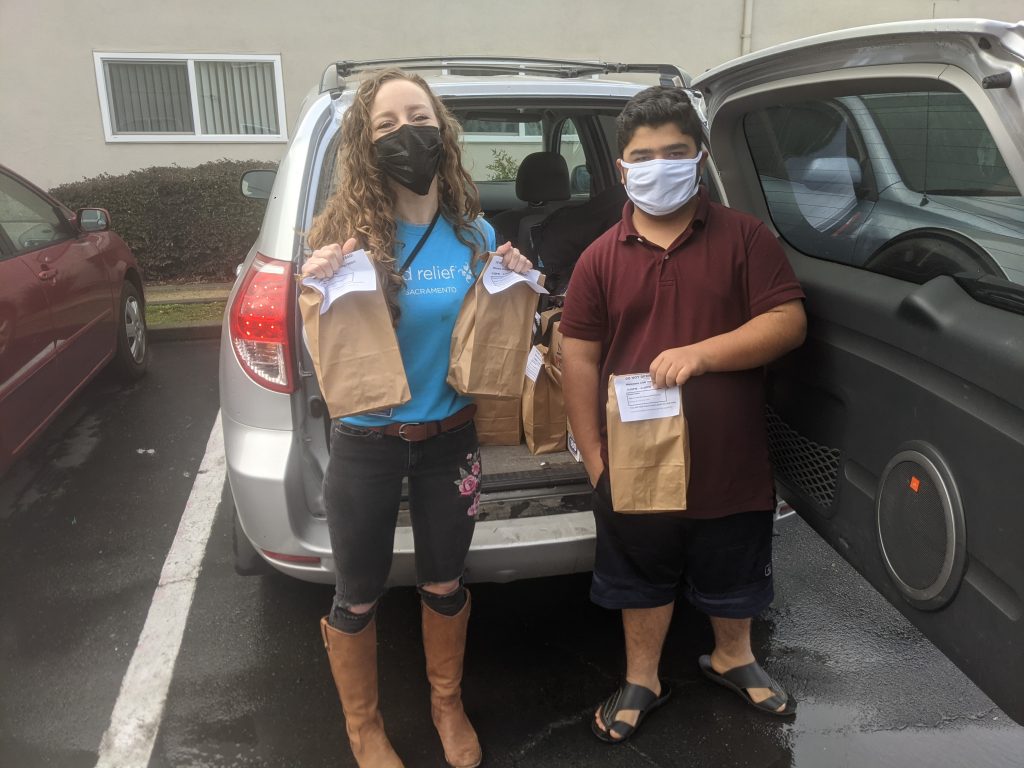
“I try to wait until he’s out of class,” Makayla says.
A group of children follow them from apartment to apartment. Mothers invite her in for tea. Her phone rings, and Makayla answers to help a student who is having an issue with her laptop. She stops to admire a girl’s braid, asks a boy about his school assignments, and greets everyone in Dari (the national Afghan language), which she’s trying to learn in her spare time.
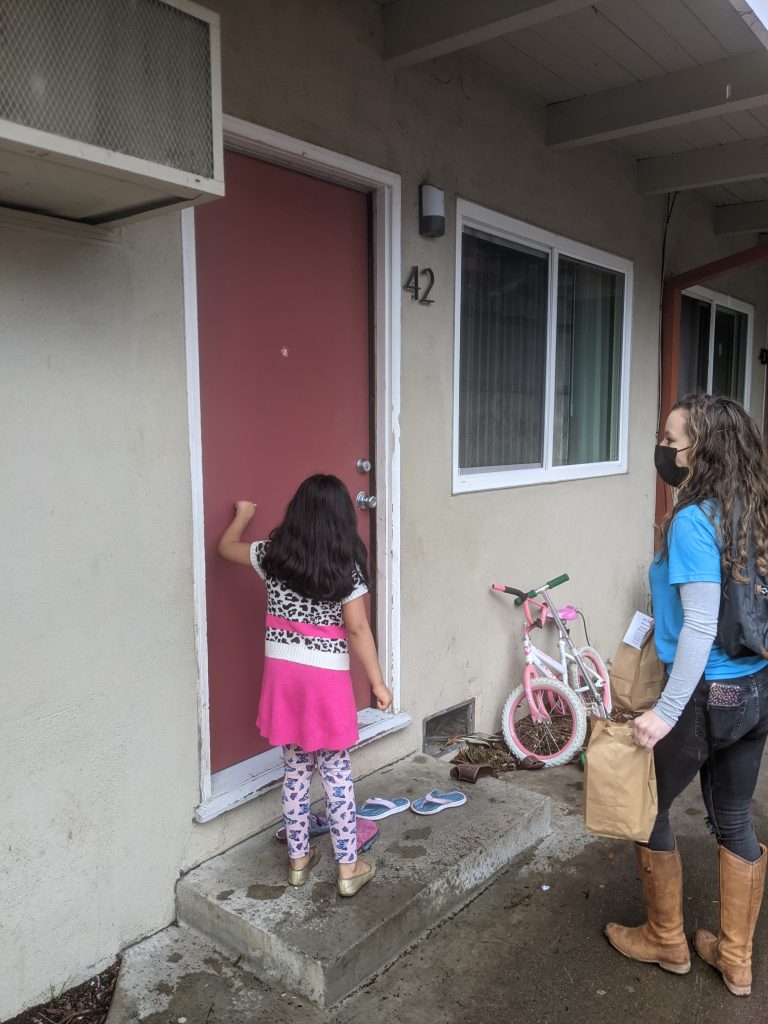
3:00 p.m.
Back at the office, Makayla and Becca log on to Welcome Club to meet with other staff and volunteers. Becca goes over the curriculum, assigning roles to each Coach. At 3:30, Makalya lets the students in from the waiting room, and soon two screens filled with 40 eager faces.
“Hi Coach Makayla! Hi Coach Becca!” The chat fills with messages of welcome and excitement.
“We are so happy you are here!” the coaches respond.
The students are always at the center of what Makayla and her team create — like the weekly Bad Banana videos that staff and students make together. Bad Banana is a character the team created to help illustrate the weekly themes.
Makayla dresses in a head-to-toe banana costume, draws on a mustache and puts on sunglasses. She is the “Bad Banana” who needs help from his Welcome Club friends. The name “Bad Banana” came from a nickname the students gave Makayla. Her name sounds like the word “kay-la” (phonetically spelled), which means banana peel in Dari, so students started calling her “Banana.”
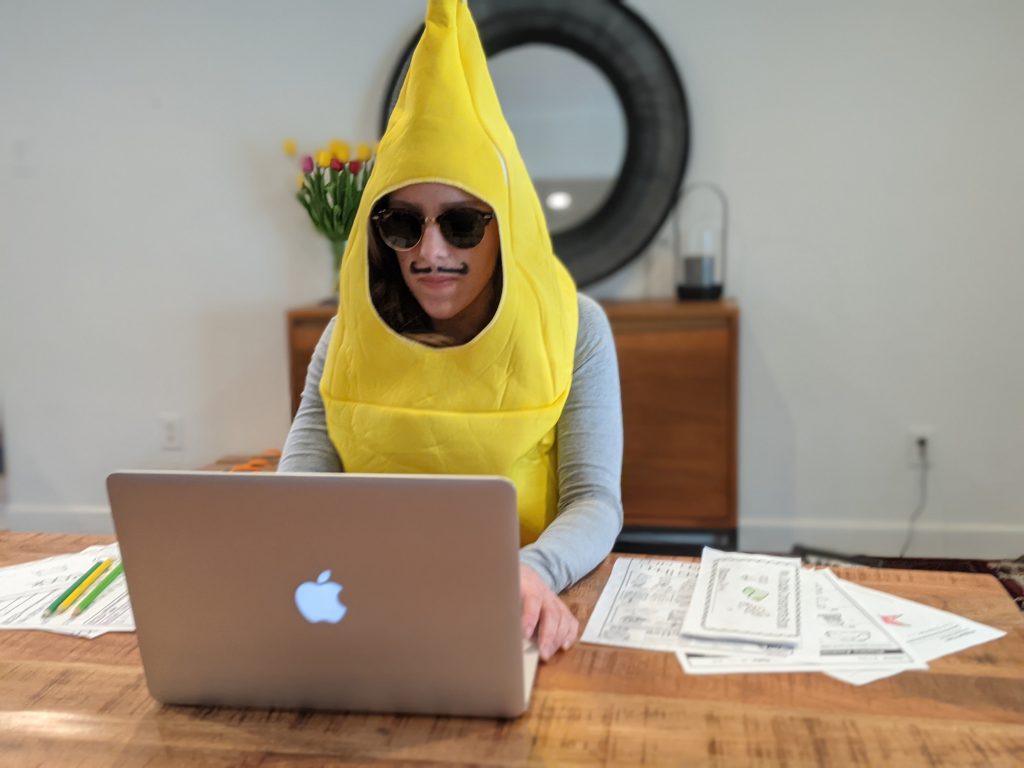
In this week’s video, Banana is struggling with distance learning. It’s too loud in his house and he can’t concentrate to do his schoolwork, so he calls his friend Horia from Welcome Club to ask her what to do. Horia tells Banana she was having a hard time, but then she asked Coach Makayla for help, and Makayla gave her headphones. Horia offers to ask on behalf of Banana, showing him what it means to be a helper.
4:00 p.m.
After the Coaches introduce themselves, students go into their breakout rooms where they play a game, talk about examples of when they gave and received help and complete the week’s craft together. During this time, Makayla moves in and out of breakout rooms.
4:30 p.m.
The students and coaches return to the main Zoom room. Makayla reminds them about tutoring on Tuesdays and Thursdays, and Becca shares the link to the latest Bad Banana video.
“Now, you have something fun to watch between now and the next Welcome Club,” she says.
The chat erupts with excited messages in response. Students sign off, though a few try to remain on for the coach’s debrief. Ehsan changes his name to “I’m a Coach!”
5:30 p.m.
After the staff debriefs, Makayla gathers up the remaining goodie bag items on the classroom floor. She makes a note of all the home visits she needs to schedule for the following week. She’s already thinking of ideas for next week’s club where they will introduce the new theme: perseverance.
Even after a full day, she is still energetic. The kids and their families make everything worth it. “Everyone who has ever succeeded at something had someone who believed in them,” she says. “I want to be one of those people who believe in them.”
There’s room for you to join staff and volunteers like Makayla as they make room for immigrants and refugees in the U.S. Give today to help programs like this flourish and enable our U.S. offices to start new ones!
To find out about local opportunities like volunteering, donating supplies, or becoming a WR Sacramento donor, find your nearest local U.S. office pages below!
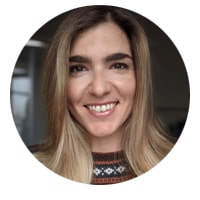
Vanassa Hamra serves as the Communications Manager for World Relief Sacramento. Her professional background is in creative writing and marketing, and she has worked in both the for profit and nonprofit sectors. She is passionate about storytelling and lives by the mantra that when you hear someone’s story, they move from being a stranger to becoming your neighbor.
Change Disrupts, But Love Still Grows
It’s been a year of difficult change. But at World Relief, we believe you were made for change — not just to survive it, but to thrive through it.In today’s story, World Relief’s Vice President of U.S. Programs, Jennifer Foy, shares how amidst this year’s disruption, creativity, resilience and love still grew.
Recently, I was reading stories from our U.S. offices when I came across this one about two brothers who had been resettled by World Relief in Chicago seven years ago. They dreamed of opening up a tailor shop together, and that dream finally became a reality — in January, mere months ahead of the COVID-19 shutdown.
Faced with this new reality, the brothers wondered if their business would survive. But then, local residents started appearing at their shop – many of whom were immigrants themselves – in desperate search of masks.
Most stores were already sold out, and online shops were selling the masks at prices much higher than what these residents could afford. As such, the brothers knew what they had to do. They pivoted their business and began making masks, finding success and even fulfilling orders from other cities and states.
Change disrupts. But that disruption can bring new perspective.
This past March, when everything seemed to change overnight, I, too, wondered what the future would hold. After three difficult years of policy changes, office closures and a diminishing number of refugees being admitted into the United States, our U.S. teams were ready for something new.
But then, COVID-19 hit. Our offices began shutting their doors, staff moved to remote work and we began redesigning our services to meet new needs.
In the early weeks, the rapid change felt like a tsunami, crashing in and overtaking every part of our work and lives. This sudden change felt like another cruel blow to our teams working so hard to share Christ’s love, as well as to those we serve working hard to integrate into their communities.
Once I finally slowed down to catch my breath and take a step back, I realized God was inviting me into a new perspective. As I looked around at all the pain, sickness and unknown, I saw that beneath the chaos, resilience existed.
I began hearing stories just like the one above from across our U.S. network. Burmese refugees in North Carolina were making masks for their community, as were World Relief sewing program participants in Spokane and Seattle. A refugee restaurant owner in California began donating meals to frontline workers. Everywhere I looked creativity, strength, persistence, fierce courage and love grew amidst the chaos of our upturned world.
Among our offices, innovation flourished. Staff and community partners found new ways to serve in a COVID environment. In-person programs such as ESL classes, job training seminars and summer camps all moved online. Volunteer trainings also became virtual, opening up new pathways for people across the country to volunteer, whether they lived near a physical office or not.
When businesses began shutting down and our immigrant communities began experiencing lay-offs, our staff learned new skills and volunteers stepped up to help immigrant business owners navigate the Cares Act Relief and fill out unemployment paperwork.
Church partners also stepped in in new ways, allowing us to meet an immediate need for food. Across our U.S. office network, more than $1.5 million in food was donated and distributed, allowing us to serve over 42,000 families. Our North Texas office alone received $997,000 in food donations for immigrant families in need.
While I am looking forward to the end of COVID, I have seen new doors open and have been forever changed by the love shown in this season.
As we look to the year ahead, I see new strength in our communities — in immigrants who have learned to use technology to help them stay connected; staff who have renewed confidence that they can, with God’s help, move mountains; and a growing diversity within our communities of people from all walks of life stepping up to serve.
Change disrupts, but in that disruption we found hope and overwhelming amounts of love. We gained a new perspective and found an opportunity to rewrite the narrative of 2020 and make change for good.
Will you help us make change for good ?

Jennifer Foy joined World Relief in 2007 as a volunteer in serving many refugee families before joining the staff in 2014. She served in the High Point North Carolina Triad office until April 2019 when she moved to World Relief’s headquarters in Baltimore to take on a national role. In her current role she oversees the program management and development across all U.S. network of offices. She brings 15 years of nonprofit leadership experience leading local nonprofits. Jennifer grew up in Oregon and received a B.A. Sociology from Western Oregon University and later a M.P.A. from Norwich University in Vermont. She lives in Maryland with her husband Will.
Made for Change
Change isn’t easy.
I can’t even begin to count how many times we’ve said that phrase over the last eight months at World Relief. When I think back to March, when our offices across the globe began closing their doors due to shelter-in-place orders, it feels like another lifetime entirely.
Like many of you, we felt the blow of loss and the weight of uncertainty as the virus made its way around the globe. We prayed, we grieved, we sought reason to hope, and together, we leaned in to ask God what he might have for us in the midst of all the disruption.
Just when we thought we might be able to adjust to these new pandemic realities, the tragic murders of Ahmaud Arbery, Breonna Taylor and George Floyd made national headlines. Calls for justice and reform swept across our nation in ways we haven’t experienced in many years. Faced with these current realities, I found myself evaluating my own blindspots in the fight for racial justice, lamenting the health of our nation and the division that continues today.
2020 has indeed ushered us into new levels of difficulty and uncertainty.
When we consider the enormity of these disruptions, the weight and even powerlessness found in this chaotic year, it can be difficult to access the spiritual energy we need to be a positive agent for change.
Many of us want to be part of the change, but are so drained we cannot carry it out. In the midst of this weariness and confusion, we may be tempted to turn away, to throw up our hands and say, “There’s just no use! Nothing I do will matter anyway.”
Others of us may be tempted to rush back to what feels normal — to prematurely begin putting our lives back together so things can get on just the way they were. But might there be another way?
Perhaps true peace and true change comes not in avoiding the weight of disruption or scrambling back to an old sense of normal, but in accessing the divine resources God has for us once our human store has run out.
King David spoke to this often in the Psalms as he cried out to God for renewal. David — a man familiar with life’s rapid and sometimes painful changes — did not shy away from his discomfort. Instead, he faced it, bringing it honestly to God.
In the opening verses of Psalm 69, David wrote:
“Save me, O God,
for the waters have come up to my neck.
I sink in the miry depths,
where there is no foothold.
I have come into the deep waters;
the floods engulf me.
I am worn out calling for help;
my throat is parched.
My eyes fail,
looking for my God.”
He continues in verse 16:
“Answer me, Lord, out of the goodness of your love;
in your great mercy turn to me.
Do not hide your face from your servant;
answer me quickly, for I am in trouble.
Come near and rescue me;
deliver me because of my foes.”
Like David, we are invited to cry out to God in this same way, laying our fear, our confusion, our anger and even our own shortcomings at his feet. It is only when we are able to name all that we carry and fully surrender it to God, that we are able to move through change, grieve our losses and make something new on the other side.
At World Relief, we recognize the gravity of this year’s change and understand that the months ahead contain challenge and uncertainty of their own, and we are also convinced that God has something good for us in the midst of change.
In fact, when we are able to tap into the divine strength found in God, we may even find that we were made for change. We were made for growth. We were made for renewal. And we were made to bring that redemption to a broken, hurting world.
With this in mind, our team has worked diligently to create a resource to help you reflect and move through the immense amounts of change we’ve experienced. It’s called Monday Meditations.
Starting on October 19th, this six-part audio series will be delivered to your inbox bi-weekly.
I hope you’ll join us in this series as we use scripture to reflect on and embrace change, discovering what it means for each of us to lean in, look forward and reimagine a hopeful future together.
Already signed up? Text this link to a friend and invite them to join you.

Scott Arbeiter is a former pastor of Elmbrook Church in Brookfield, Wisconsin, and the president of World Relief, which is a subsidiary of the National Association of Evangelicals.
Rwanda Responds to COVID-19
It’s been a difficult season here in Rwanda. Like many places around the world, Rwanda experienced a total lockdown from mid-March to mid-May as cases of COVID-19 began sprouting up in communities across our country. Today, though some communities have begun to reopen, things have not completely returned to normal.
Most church buildings are still closed. Weddings can only have 30 people in attendance. Everyone must wear facemasks whenever we are out and about, and a country-wide curfew that begins at 7 p.m. and ends at 5 a.m. is still in place.
It’s been a difficult time, indeed, but the hardships and restrictions have caused us to think creatively and find new ways to serve the vulnerable and meet their evolving needs.
At World Relief Rwanda, we currently run programs in six different communities through what we call Church Empowerment Zones (CEZs). CEZs are networks of local churches that have come together to serve the most vulnerable. It is through these CEZs that we are able to offer programs in savings, gender equality and agriculture to name a few.
One such community is Nyamasheke District in Western Province Rwanda. Many of our staff who work in Nyamasheke live in a neighboring district that is currently still on total lockdown because of the high number of COVID-19 cases in that area. As a result, our staff are not able to leave their district to go to work in Nyamasheke.
In addition, many of the men and women in Nyamasheke rely on daily wages to meet their basic needs. But when the markets shut down, they had nowhere to sell their goods and missed out on that vital income. It’s been heartbreaking for myself and the rest of our team to see vulnerable people becoming more vulnerable.
But in the midst of this hardship, our team has been so encouraged to see local pastors from the Nyamasheke CEZ come together to continue serving the vulnerable in their communities. Although these pastors rely on the regular tithes and offerings that aren’t currently coming in due to churches being closed, they’ve banded together, mobilized their members and said, “We are going to do the best we can with the resources God has given us to really care for the vulnerable.”
Pastors like the ones from Nyamasheke have really stepped up by providing food to those who have not been able to make an income. Since March, churches from across the six CEZs served 4,056 families. In addition to these families, World Relief provided support to 1,346 families as well as support for 350 pastors and their families.
As we continue to adapt to this evolving situation in Rwanda, our team has drawn strength from scripture like this one found in 1 Corinthians 15:58 — “Therefore, my beloved brethren, be steadfast, immovable, always abounding in the work of the Lord, knowing that your labor is not in vain in the Lord.”
We’d ask that you continue to pray for us in Rwanda — for the health and safety of our staff as they carry out programs in compliance with social distancing measures; and for the pastors with whom we partner, that they would continue to discern and pursue God’s will in this difficult season.
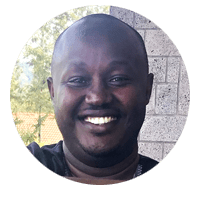
Moses Ndahiro serves as the Country Director for World Relief Rwanda. He is passionate about addressing the roots of human problems and unlocking people’s potential to fulfill their God-given purposes.
COVID and the Issues: Gender-Based Violence
An estimated 243 million women and girls around the world have been subjected to sexual and/or physical violence by an intimate partner in the last 12 months. Experts warn that this number is likely to increase dramatically as security, health and money worries heighten stress within homes, and confined living conditions place women at heightened risk.
Today, in the last of our six-week series, COVID and the Issues, we’re talking with Joanna Kretzer Chun, World Relief’s Director of our Program Resource Team who reveals why many are calling the rise in COVID related gender-based violence the “shadow pandemic.”
In the discussion that follows, Joanna explains how World Relief takes a comprehensive approach to preventing gender-based violence. She explains some of the factors that are creating this “shadow pandemic,” and reveals why women at risk of gender-based violence are less likely to get the help they need right now. While there are no simple solutions, it was encouraging to hear Joanna’s thoughts on what we’re learning as an organization and how these learnings can help women both now and in the future.
To learn more about how COVID-19 is affecting other program areas, view the rest of the COVID and the Issues series here.
COVID and the Issues: Food Security & Nutrition
Last month, Oxfam projected that the number of people experiencing crisis-level hunger could reach 270 million in 2020 as a result of the coronavirus pandemic – an increase of over 80%.
The number is shocking.
Today, in the fifth of our six-week series, COVID and the Issues, we’re talking with Prava Chhetri and Rafael Flores, World Relief’s Technical Advisors for Food Security & Nutrition.
They will share about this concerning projection, as well as how COVID is impacting our nutrition work on the ground.
In the discussion that follows, Prava & Rafael give a brief overview of our food security and nutrition programs and discuss how COVID-19 is impacting global food production and access, as well as the nutritional consequences of this change.
They also open up about how World Relief’s programs are adapting in the face of this crisis, ensuring we do all we can to prevent the next major global famine.

Francesca Albano currently serves as Director of Branded Content at World Relief. With a background in Cultural Anthropology and a graduate degree in Strategic Marketing Communications, she connects her interests in societal studies and global cultures with her training in brand strategy and storytelling. Francesca is especially passionate about grassroots community development and the treatment and advancement of women and girls around the world.











